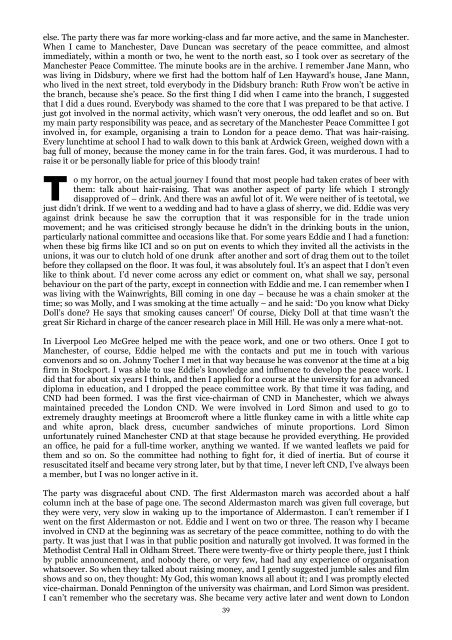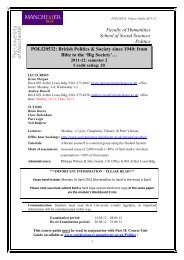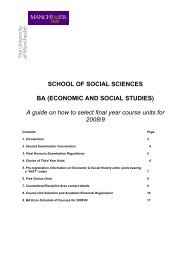CHNN 22, Spring 2008 - School of Social Sciences
CHNN 22, Spring 2008 - School of Social Sciences
CHNN 22, Spring 2008 - School of Social Sciences
Create successful ePaper yourself
Turn your PDF publications into a flip-book with our unique Google optimized e-Paper software.
else. The party there was far more working-class and far more active, and the same in Manchester.<br />
When I came to Manchester, Dave Duncan was secretary <strong>of</strong> the peace committee, and almost<br />
immediately, within a month or two, he went to the north east, so I took over as secretary <strong>of</strong> the<br />
Manchester Peace Committee. The minute books are in the archive. I remember Jane Mann, who<br />
was living in Didsbury, where we first had the bottom half <strong>of</strong> Len Hayward’s house, Jane Mann,<br />
who lived in the next street, told everybody in the Didsbury branch: Ruth Frow won’t be active in<br />
the branch, because she’s peace. So the first thing I did when I came into the branch, I suggested<br />
that I did a dues round. Everybody was shamed to the core that I was prepared to be that active. I<br />
just got involved in the normal activity, which wasn’t very onerous, the odd leaflet and so on. But<br />
my main party responsibility was peace, and as secretary <strong>of</strong> the Manchester Peace Committee I got<br />
involved in, for example, organising a train to London for a peace demo. That was hair-raising.<br />
Every lunchtime at school I had to walk down to this bank at Ardwick Green, weighed down with a<br />
bag full <strong>of</strong> money, because the money came in for the train fares. God, it was murderous. I had to<br />
raise it or be personally liable for price <strong>of</strong> this bloody train!<br />
T<br />
o my horror, on the actual journey I found that most people had taken crates <strong>of</strong> beer with<br />
them: talk about hair-raising. That was another aspect <strong>of</strong> party life which I strongly<br />
disapproved <strong>of</strong> – drink. And there was an awful lot <strong>of</strong> it. We were neither <strong>of</strong> is teetotal, we<br />
just didn’t drink. If we went to a wedding and had to have a glass <strong>of</strong> sherry, we did. Eddie was very<br />
against drink because he saw the corruption that it was responsible for in the trade union<br />
movement; and he was criticised strongly because he didn’t in the drinking bouts in the union,<br />
particularly national committee and occasions like that. For some years Eddie and I had a function:<br />
when these big firms like ICI and so on put on events to which they invited all the activists in the<br />
unions, it was our to clutch hold <strong>of</strong> one drunk after another and sort <strong>of</strong> drag them out to the toilet<br />
before they collapsed on the floor. It was foul, it was absolutely foul. It’s an aspect that I don’t even<br />
like to think about. I’d never come across any edict or comment on, what shall we say, personal<br />
behaviour on the part <strong>of</strong> the party, except in connection with Eddie and me. I can remember when I<br />
was living with the Wainwrights, Bill coming in one day – because he was a chain smoker at the<br />
time; so was Molly, and I was smoking at the time actually – and he said: ‘Do you know what Dicky<br />
Doll’s done? He says that smoking causes cancer!’ Of course, Dicky Doll at that time wasn’t the<br />
great Sir Richard in charge <strong>of</strong> the cancer research place in Mill Hill. He was only a mere what-not.<br />
In Liverpool Leo McGree helped me with the peace work, and one or two others. Once I got to<br />
Manchester, <strong>of</strong> course, Eddie helped me with the contacts and put me in touch with various<br />
convenors and so on. Johnny Tocher I met in that way because he was convenor at the time at a big<br />
firm in Stockport. I was able to use Eddie’s knowledge and influence to develop the peace work. I<br />
did that for about six years I think, and then I applied for a course at the university for an advanced<br />
diploma in education, and I dropped the peace committee work. By that time it was fading, and<br />
CND had been formed. I was the first vice-chairman <strong>of</strong> CND in Manchester, which we always<br />
maintained preceded the London CND. We were involved in Lord Simon and used to go to<br />
extremely draughty meetings at Broomcr<strong>of</strong>t where a little flunkey came in with a little white cap<br />
and white apron, black dress, cucumber sandwiches <strong>of</strong> minute proportions. Lord Simon<br />
unfortunately ruined Manchester CND at that stage because he provided everything. He provided<br />
an <strong>of</strong>fice, he paid for a full-time worker, anything we wanted. If we wanted leaflets we paid for<br />
them and so on. So the committee had nothing to fight for, it died <strong>of</strong> inertia. But <strong>of</strong> course it<br />
resuscitated itself and became very strong later, but by that time, I never left CND, I’ve always been<br />
a member, but I was no longer active in it.<br />
The party was disgraceful about CND. The first Aldermaston march was accorded about a half<br />
column inch at the base <strong>of</strong> page one. The second Aldermaston march was given full coverage, but<br />
they were very, very slow in waking up to the importance <strong>of</strong> Aldermaston. I can’t remember if I<br />
went on the first Aldermaston or not. Eddie and I went on two or three. The reason why I became<br />
involved in CND at the beginning was as secretary <strong>of</strong> the peace committee, nothing to do with the<br />
party. It was just that I was in that public position and naturally got involved. It was formed in the<br />
Methodist Central Hall in Oldham Street. There were twenty-five or thirty people there, just I think<br />
by public announcement, and nobody there, or very few, had had any experience <strong>of</strong> organisation<br />
whatsoever. So when they talked about raising money, and I gently suggested jumble sales and film<br />
shows and so on, they thought: My God, this woman knows all about it; and I was promptly elected<br />
vice-chairman. Donald Pennington <strong>of</strong> the university was chairman, and Lord Simon was president.<br />
I can’t remember who the secretary was. She became very active later and went down to London<br />
39
















